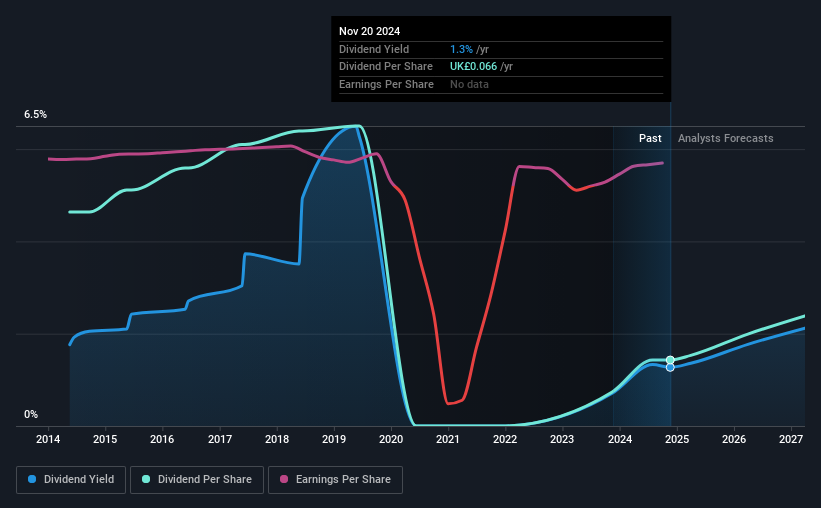- United Kingdom
- /
- Aerospace & Defense
- /
- LSE:BAB
Babcock International Group (LON:BAB) Has Announced A Dividend Of £0.02
The board of Babcock International Group PLC (LON:BAB) has announced that it will pay a dividend on the 17th of January, with investors receiving £0.02 per share. This means the annual payment will be 1.3% of the current stock price, which is lower than the industry average.
View our latest analysis for Babcock International Group
Babcock International Group's Future Dividend Projections Appear Well Covered By Earnings
It would be nice for the yield to be higher, but we should also check if higher levels of dividend payment would be sustainable. Before making this announcement, Babcock International Group was easily earning enough to cover the dividend. As a result, a large proportion of what it earned was being reinvested back into the business.
Looking forward, earnings per share is forecast to rise by 44.8% over the next year. If the dividend continues on this path, the payout ratio could be 8.4% by next year, which we think can be pretty sustainable going forward.

Dividend Volatility
While the company has been paying a dividend for a long time, it has cut the dividend at least once in the last 10 years. Since 2014, the dividend has gone from £0.214 total annually to £0.066. This works out to a decline of approximately 69% over that time. Generally, we don't like to see a dividend that has been declining over time as this can degrade shareholders' returns and indicate that the company may be running into problems.
Dividend Growth Is Doubtful
Dividends have been going in the wrong direction, so we definitely want to see a different trend in the earnings per share. In the last five years, Babcock International Group's earnings per share has shrunk at approximately 6.5% per annum. A modest decline in earnings isn't great, and it makes it quite unlikely that the dividend will grow in the future unless that trend can be reversed. Earnings are predicted to grow over the next year, but we would remain cautious until a track record of earnings growth is established.
In Summary
Overall, we don't think this company makes a great dividend stock, even though the dividend wasn't cut this year. The payments haven't been particularly stable and we don't see huge growth potential, but with the dividend well covered by cash flows it could prove to be reliable over the short term. We would be a touch cautious of relying on this stock primarily for the dividend income.
Market movements attest to how highly valued a consistent dividend policy is compared to one which is more unpredictable. At the same time, there are other factors our readers should be conscious of before pouring capital into a stock. Without at least some growth in earnings per share over time, the dividend will eventually come under pressure either from competition or inflation. Very few businesses see earnings consistently shrink year after year in perpetuity though, and so it might be worth seeing what the 9 analysts we track are forecasting for the future. If you are a dividend investor, you might also want to look at our curated list of high yield dividend stocks.
Valuation is complex, but we're here to simplify it.
Discover if Babcock International Group might be undervalued or overvalued with our detailed analysis, featuring fair value estimates, potential risks, dividends, insider trades, and its financial condition.
Access Free AnalysisHave feedback on this article? Concerned about the content? Get in touch with us directly. Alternatively, email editorial-team (at) simplywallst.com.
This article by Simply Wall St is general in nature. We provide commentary based on historical data and analyst forecasts only using an unbiased methodology and our articles are not intended to be financial advice. It does not constitute a recommendation to buy or sell any stock, and does not take account of your objectives, or your financial situation. We aim to bring you long-term focused analysis driven by fundamental data. Note that our analysis may not factor in the latest price-sensitive company announcements or qualitative material. Simply Wall St has no position in any stocks mentioned.
About LSE:BAB
Babcock International Group
Engages in the design, development, manufacture, and integration of specialist systems for aerospace, defense, and security in the United Kingdom, rest of Europe, Africa, North America, Australasia, and internationally.
Excellent balance sheet with proven track record.
Similar Companies
Market Insights
Community Narratives



